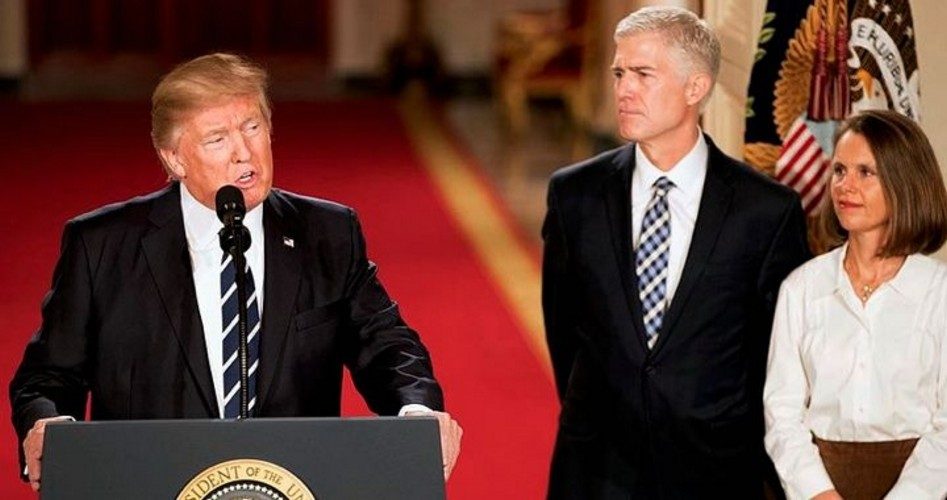
Operating at full strength for the first time since the death of Justice Antonin Scalia in February 2016, the Supreme Court will hold a private conference on Thursday morning to determine whether the court will address three separate but vital appeals.
The first is an appeal brought by the Trinity Lutheran Church of Columbia, Missouri, over the denial by Missouri of the church’s request to participate in a grant program offering recycled tires to various non-profits in the state. The church operates a child learning center open to the public. The request was turned down due to a section in the state’s constitution that prohibits government aid to religion. The recycled tires would have replaced a large portion of the pea-gravel surface of its playgrounds with a rubberized product made from them. The church’s request was turned down solely because the daycare center was operated by a church.
At issue, seemingly innocuous at first glance, is the phrase “separation of church and state,” that amorphous concept emanating from attempts by the Founders to allow religions freedom to pursue their callings without the state interfering or promoting one religion over another.
The list of those parties joining in an amicus curiae brief in support of the church runs for pages.
Justice Gorsuch (shown in the middle) took a pro-religion position in the Hobby Lobby case, in a 10 Commandments case, and in a ruling over a state’s program for erecting crosses along highways commemorating fallen state troopers.
On Thursday the court could decide to review an appeal in the Masterpiece Cakeshop case, involving a business owner’s decision not to bake a wedding cake for a same-sex couple as it conflicted with his religious beliefs. The homosexual couple secured the assistance of the ACLU, which filed a complaint with the Colorado Civil Rights Commission for sexual-orientation discrimination. The commission ruled against the owner, requiring him to “change its company policies, provide ‘comprehensive staff training’ regarding public accommodations discrimination, and provide quarterly reports for the next two years regarding steps it had taken to come into compliance and whether it has turned away any prospective customers” for similar reasons.
If the court decides to take up this issue, Jeremy Tedesco, a lawyer for the pro bono law firm defending the owner, Alliance Defending Freedom, is optimistic about its outcome, saying, “I think Justice Gorsuch would be with us.”
The third case, Peruta v. San Diego County, is a Second Amendment issue involving the city’s restrictions on obtaining a concealed carry permit. Under state law those applying must show “good cause” that “distinguishes the applicant from the mainstream and places the applicant in harm’s way.” In other words, the claim of simple self-defense isn’t good enough. The U.S. Court of Appeals for the Ninth Circuit ruled 7-4 that “there is no Second Amendment right for members of the general public to carry concealed firearms in public. The majority wrote:
The protection of the Second Amendment — whatever the scope of that protection may be — simply does not extend to the carrying of concealed firearms in public by members of the general public….
Because the Second Amendment does not protect in any degree the right to carry concealed firearms in public, any prohibition or restriction a state may choose to impose on concealed carry — including the requirement for ‘good cause’, however defined — is necessarily allowed by the [Second] Amendment.
If the court reviews this case, it could, according to Adam Winkler, a professor of constitutional law at the UCLA School of Law, “be the most important Second Amendment case since D.C. vs. Heller.” In that case the Supreme Court ruled in 2008 that the Second Amendment guarantees an individual’s right to keep and bear firearms. The court didn’t rule on the issue of carrying outside the home, either openly or concealed, and its ruling in Peruta on appeal would clarify it.
Any of these cases, if taken on by the court on Thursday, will resolve vitally important issues. If all three are taken on appeal, the results could hardly be more important, not only over the issues being decided but also allowing the informed citizenry its first glimpse as to what type of jurist Gorsuch is likely to be. Touted as an “originalist” of the Constitution, and given his pro-religion rulings in the past, those observers are optimistic that Gorsuch will bring a limited-government perspective to the court that has been missing since Scalia.
An Ivy League graduate and former investment advisor, Bob is a regular contributor to The New American magazine and blogs frequently at LightFromTheRight.com, primarily on economics and politics. He can be reached at [email protected].



